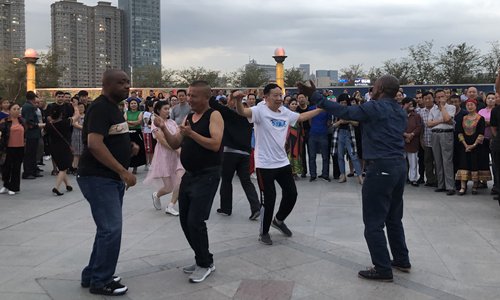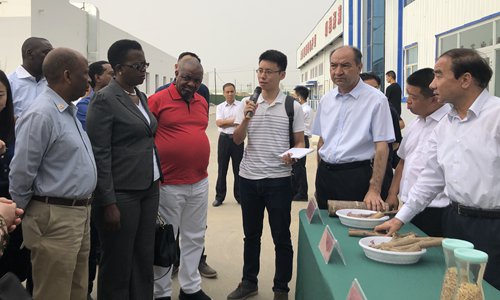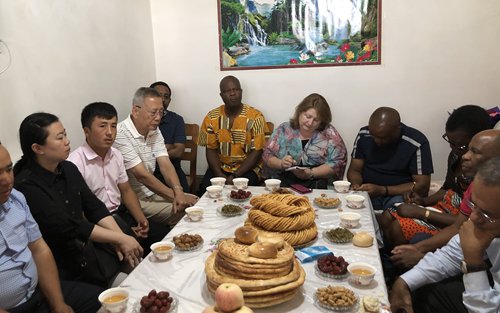

○ China's experience with the vocational education and training centers in Xinjianghas been very successful and is worth learning by countries seeking to de-radicalize and fight terrorism: envoy
○ Countries, especially those from the developing world free from ideological biases, recognize and understand the practices and initiatives China has implemented in Xinjiang, especially after they visited the region
○ Vicious speculations and misleading reports on China's Xinjiang policy are waning, as some countries are convinced the training centers in Xinjiang are a feasible and effective way to de-radicalize: scholar

Foreign envoys to the United Nations Office at Geneva dance with local residents at a square in Urumqi, Northwest China's Xinjiang Uyghur Autonomous Region on August 28. Photo: Song Shengxia/GT
Shaking hands firmly with Maihemutijiang Musha, a graduate of a vocational education and training center in Xinjiang, Ali Mohamed Saeed Majawar, a Yemen envoy to the UN in Geneva, said, "I am so happy to see you back on the right path. I hope you could be a role model for other young people, and that they could learn from you."
Maihemutijiang smiled as he thanked the visiting envoy, who recently headed a delegation of diplomats from eight countries to the United Nations Office at Geneva (UNOG) to Northwest China's Xinjiang Uyghur Autonomous Region at the invitation of the Chinese Foreign Ministry.
Geneva-based envoys from Yemen, Equatorial Guinea, Mozambique, Zambia, C te d'Ivoire, South Africa, Ethiopia and Zimbabwe wrapped up their five-day tour to Xinjiang on Sunday, visiting a counter-terrorism exhibition, training centers, communities, mosques, bazaars, kindergartens, cultural heritage sites and industrial parks in Urumqi, Hotan and Kashi.
They talked to trainees at training centers in Hotan and Kashi and Maihemutijiang, the Kashi center graduate.
The 25-year-old newlywed was trained in the Kashi center in 2018 after he was found visiting illegal websites where he downloaded and spread video and audio which promote extremism and terrorism. Influenced by extremism, he became aggressive, arrogant and ready to pick fights with non-Muslims, forcing them to pray.
His father described him as a "wild horse" who was out of control and used to wander on the streets for a few days, reluctant to go home. He refused to eat food cooked by his mother because he thought it was not halal.
After 10 months of training at the center, where he learned vocational skills such as machine repairing, interior design and sewing, he landed a job at a local plastic steel window and door factory, earning over 3,000 yuan ($419) a month. He met his wife at work and got married two weeks ago.
"The training center reshaped my life. Now I live a new life. It is like being reborn," the young man said to the group of visiting diplomats.

A delegation of envoys from Yemen, Equatorial Guinea, Mozambique, Zambia, C te d'Ivoire, South Africa, Ethiopia and Zimbabwe to the United Nations Office at Geneva (UNOG) visit a fungus factory in Hotan, Northwest China's Xinjiang Uyghur Autonomous Region on August 30. Photo: Song Shengxia/GT
Consensus and awareness
Vocational training is an effective way to help young people get work and help fight poverty and extremism, which breed terrorism. China's experience in the vocational education and training center in Xinjiang has been very successful and is worth learning by countries seeking to de-radicalize and fight terrorism, said Majawar, Permanent Representative of Yemen to the UNOG.
I believe the Chinese government should continue its efforts, and has the full right to conduct vocational training and re-education, Majawar said through an interpreter.
Majawar is not alone among the visiting delegates in this view.
Martha Lungu Mwitumwa, Permanent Representative of Zambia to the UNOG, choked through tears and needed a few minutes before she could gather herself to speak after viewing the exhibition on major terrorist cases in Xinjiang at the Xinjiang International Convention and Exhibition Center in Urumqi.
"I feel heartbroken to see how innocent people were killed for no apparent reason. Even the young ones and children were targeted," she said after seeing the pictures of blood and torn flesh of victims, and displays of weapons that terrorists used to commit terror acts which were once rampant in Xinjiang.
"We are here and have seen for ourselves. I am happy to hear that in the past two years, this has not been happening. The government has taken control of the situation and [prevented the spread of terrorism]," Mwitumwa said.
In July, 50 ambassadors to the UNOG signed a letter to the president of the UN Human Rights Council and the UN High Commissioner for Human Rights, voicing their support for China's position on issues related to Xinjiang. Yemen and Zambia are among the 50 countries that signed the letter.
The letter is believed by observers to be a direct response to a letter from some Western countries criticizing China on the issue.
While some Western countries blinded by ideological biases chose to oppose China for the sake of "opposing China" on Xinjiang-related issues at UN Human Rights Council sessions, other countries, especially those from the developing world free from ideological biases, recognize and understand the practices and initiatives China has implemented in Xinjiang, especially after they visited the region, observers said.
It is those countries that are willing to speak for and defend China on its Xinjiang policy, they noted.
"From what we have seen, the training centers are a good initiative, because they are helping the youth, and even the elderly, settle into society," Mwitumwa said.
"Instead of getting involved in evil practices such as terrorism, they will concentrate on business rather than go to the street to kill people. After graduating, they can set up businesses, which will empower their families as well, Mwitumwa said.
Mwitumwa added that she will bring back to Geneva what she saw in Xinjiang and all the stories she heard.
Nelia Barnard, Deputy Permanent Representative of South Africa to the UNOG, who had never been to Xinjiang, told the Global Times, "What I have been exposed to and have witnessed [in this trip] are quite positive. You can see genuine efforts to improve the social, economic and cultural environment of the people here."
Amadeu Paulo Samuel Da Conceicao, Permanent Representative of Mozambique to the UNOG, said in Mozambique, people are aware of what violence has brought to innocent people. The visit to the counter-terrorism exhibition in Urumqi reminded him of similar incidents in his country.
At the UN Human Rights Council sessions, he noticed that some Western countries had no clear idea of China's efforts and achievements in Xinjiang. Perhaps they may have some vague idea of what is happening in Xinjiang, but they don't want to speak out and are unwilling to recognize China's efforts, Conceicao said.

Foreign envoys talk to Maihemutijiang Musha, a vocational and training center graduate in Xinjiang, and his family at his home on August 31. Photo: Song Shengxia/GT
Petty tricks in Geneva
The UN Human Rights Council Universal Periodic Review (UPR) mechanism aims to review how well UN member states fulfill their duties and commitments on human rights on a regular basis. In March, China completed its 3rd UN Human Rights Council UPR process, which started in November 2018.
"The impression I got from [what I heard] about Xinjiang in Geneva was Xinjiang was a prison, and people were being manipulated. After seeing the situation, I don't believe what I heard in Geneva," Mwitumwa said.
The information Mwitumwa received about Xinjiang in Geneva only mirrors part of the smear tactics of some Western countries to impose their ideological biases against China's policy in Xinjiang, observers said.
Zuliyati Simayi, a professor at Xinjiang University and a member of the China Society for Human Rights Studies, who attended the review process in Geneva in November, told the Global Times that Western countries usually push NGOs to confront China.
"Given China's international influence, some countries do not want to openly offend China by slandering China's policy in Xinjiang at the UN review sessions. But they would do petty things behind your back, such as using some NGO as their mouthpiece against China," Zuliyati said.
"These NGOs use harsh rhetoric to criticize China under the guise of human rights protection. They appear to value independence but their rhetoric is full of speculations and sentimental judgment," Zuliyati said.
Zhang Yonghe, executive dean of the human rights institute of Southwest University of Political Science and Law in Chongqing, who also attended the November review sessions, told the Global Times that the US backs many NGOs.
Although the US withdrew from the UN Human Rights Council, it still attempts to turn the UN Human Rights Council sessions into an international stage to confront and antagonize China through either its Western allies or various organizations.
Another trick that the West uses against China during the review sessions is to instigate "East Turkistan" terrorist groups to gather outside the meeting venue to exert pressure on review meetings.
Zhang recalled that in a November session meeting, some "East Turkistan" terrorist groups staged a rally outside the Palace of Nations square and caused a commotion outside to influence the meeting. Some deliberately approached the Chinese delegates or scholars, took photos of them, attempting to trap them and to make a big scene if the Chinese side prevented them from doing so.
To deal with these dirty tricks, China is neither humble nor pushy but uses detailed data and evidence to convince and win over more countries and organizations, Zhang said.
"During our exchanges with the Jeddah-based Organization of Islamic Cooperation, they finally prolonged the scheduled 40-minute meeting to two hours. Later, they admitted that the source they previously relied on to get information about Xinjiang was one-sided, mainly from Western media," Zhang said.

Seeing is believing
Back at Kashi's training center, the foreign envoys and reporters talked freely to the trainees through their interpreter.
Mairiyemuguli Aili, a female trainee, said coming to the center was the "best choice" in her life. Her eyes became misty when she said this.
She came to the center because she read and spread books that contain content inciting extremism.
Affected by extremism, Mairiyemuguli smashed the TV and radio at home and even swore at her mother because she thought she was a heretic. But she is a changed woman after receiving training at the center. Mairiyemuguli wanted to become an electrician after graduating to help her father with his repair shop.
"Xinjiang is still a hot topic in Geneva. But vicious speculations and misleading reports on China's Xinjiang policy are waning, as some countries are convinced the vocational education and training centers in Xinjiang are a feasible and effective way to de-radicalize," Zuliyati said.
That's also because China is more open and willing to invite foreign envoys and media to Xinjiang, Zuliyati said.
"We have seen no problems in Xinjiang, no violation of human rights or freedom of religious belief. I believe officials from any country who have come here must admit it," said Lazaro Ekua Avomo, Permanent Representative of Equatorial Guinea to the UNOG.
"Seeing is believing. For us, we believe what we saw. The Chinese government should continue to inform people of what is happening in Xinjiang. It should continue to talk and let its voice be heard until everyone hears and understands," Mwitumwa said.

 Award-winning photos show poverty reduction achievements in NE China's Jilin province
Award-winning photos show poverty reduction achievements in NE China's Jilin province People dance to greet advent of New Year in Ameiqituo Town, Guizhou
People dance to greet advent of New Year in Ameiqituo Town, Guizhou Fire brigade in Shanghai holds group wedding
Fire brigade in Shanghai holds group wedding Tourists enjoy ice sculptures in Datan Town, north China
Tourists enjoy ice sculptures in Datan Town, north China Sunset scenery of Dayan Pagoda in Xi'an
Sunset scenery of Dayan Pagoda in Xi'an Tourists have fun at scenic spot in Nanlong Town, NW China
Tourists have fun at scenic spot in Nanlong Town, NW China Harbin attracts tourists by making best use of ice in winter
Harbin attracts tourists by making best use of ice in winter In pics: FIS Alpine Ski Women's World Cup Slalom
In pics: FIS Alpine Ski Women's World Cup Slalom Black-necked cranes rest at reservoir in Lhunzhub County, Lhasa
Black-necked cranes rest at reservoir in Lhunzhub County, Lhasa China's FAST telescope will be available to foreign scientists in April
China's FAST telescope will be available to foreign scientists in April